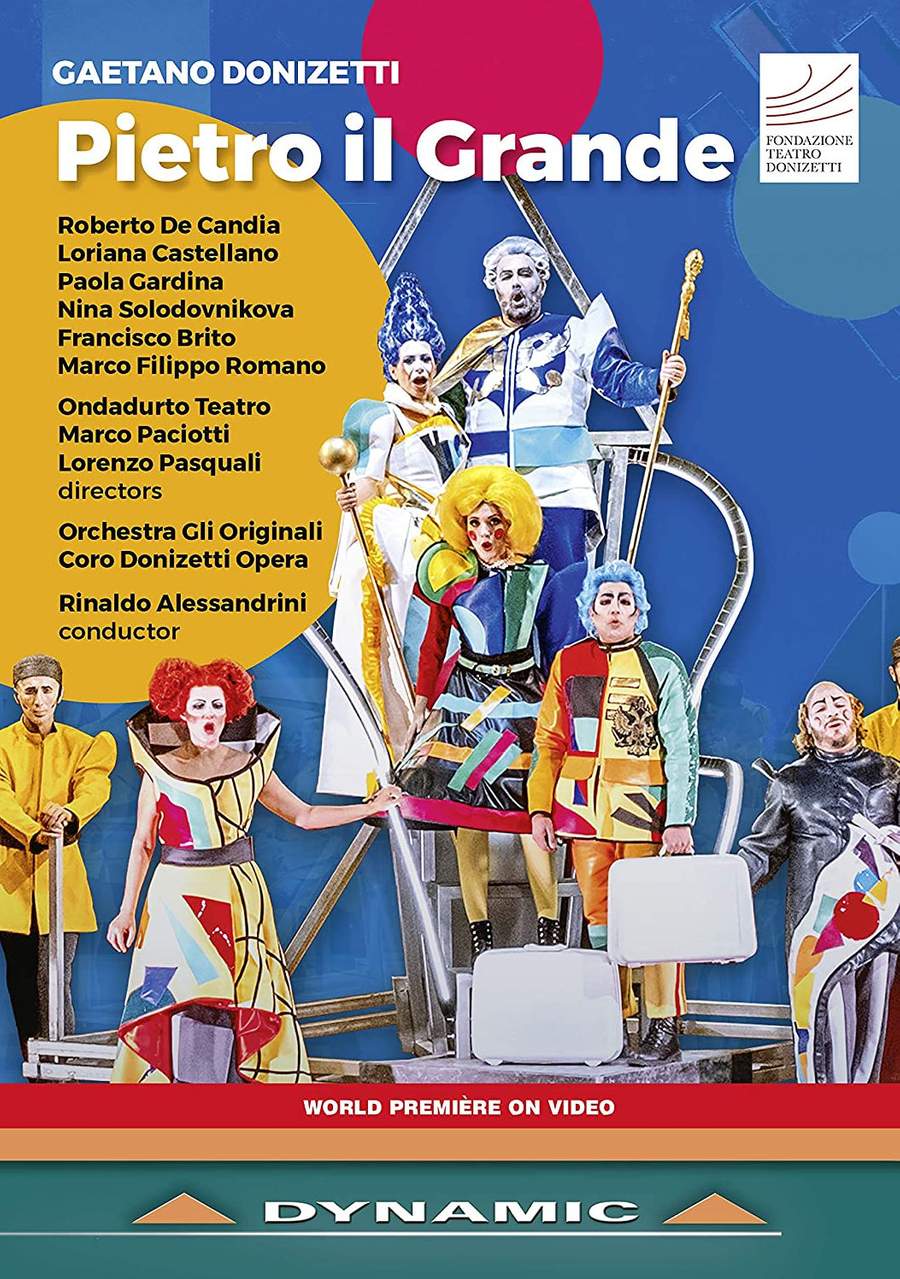DONIZETTI Pietro Il Grande (Alessandrini)
View record and artist detailsRecord and Artist Details
Composer or Director: Rinaldo Alessandrini
Genre:
Opera
Label: Dynamic
Magazine Review Date: 04/2021
Media Format: Digital Versatile Disc
Media Runtime: 166
Mastering:
DDD
Catalogue Number: 37847

Tracks:
| Composition | Artist Credit |
|---|---|
| Pietro il Grande, Kzar delle Russie |
Gaetano Donizetti, Composer
Coro Donizetti Francisco Brito, Carlo Scavronski, Tenor Loriana Castellano, Caterina, Mezzo soprano Marcello Nardis, Hondedisky, Tenor Marco Filippo Romano, Ser Cuccupis, Baritone Nina Solodovnikova, Annetta Mazepa, Soprano Orchestra Gli Originali Paola Gradina, Madama Fritz, Mezzo soprano Rinaldo Alessandrini, Composer Roberto de Candia, Pietro il Grande, Bass Stefano Gentili, Notaio, Baritone Tommaso Barea, Firman-Trombest, Baritone |
Author: Tim Ashley
Donizetti’s fourth opera, Pietro il Grande, kzar delle Russie was first performed in Venice in 1819. An apprentice work in some respects, it was a moderate success, holding the stage in Italy until the late 1820s, after which it vanished from the repertory, remaining in limbo until 2003, when its flattering portrait of Peter the Great ensured its first modern revival in St Petersburg as part of the tercentenary celebrations of the city’s founding. The new recording, its first on DVD, derives from the 2019 Donizetti Festival production, conducted by Rinaldo Alessandrini and directed by Marco Paciotti and and Lorenzo Pasquali, co founders of the physical theatre company Ondadurto Teatro in Rome.
It’s an immensely engaging work, if at times flawed. Based on a play by Alexandre Duval, popular in its day, it presents a fanciful, fictionalised portrait of Pietro’s peregrinations round his empire with his tsarina Caterina in search of her long-lost brother. The latter, discovered in a village in Livonia (Latvia), turns out to be the hotheaded carpenter Carlo, loved, unrequitedly, by the local innkeeper Madama Fritz (who has taken him in), in love in his turn with Annetta Mazepa (daughter of the rebel familiar from Byron, Liszt, Tchaikovsky, etc), and repeatedly falling foul of the local magistrate Ser Cuccupis.
Narrative and dramatic structure sprawl a bit, and much of the score is fashioned after Rossinian models. A big Act 2 sextet, pivoting around the revelation of Mazepa’s death, has much of the intricacy of the first-act finale of L’italiana in Algeri. Elsewhere Donizetti’s growing originality shines through. Ser Cuccupis’s entrance aria pre-empts the music he would later provide for Dulcamara, and indeed he went on to reuse one of Pietro’s choruses in Elisir. Most striking, perhaps, are the dramatic pre-echoes of Sachs and the Marschallin in the figure of Madama Fritz, working, with joy as well as sadness, for the happiness of a younger beloved who will never be hers.
Paciotti and Pasquali’s production is clever, stylised, a bit gaudy. The abstract, geometric sets, assembled and moved around by Ondadurto Teatro’s silent actors, and the angular, patterned costumes recall the Constructivist theatre designs of Rodchenko and Popova. Carlo in his carpenter’s workshop is building models of the platforms we see on stage. The chorus, whether soldiers or flunkies from Pietro’s baggage train, are drilled in formations that could be tauter. There’s a moment of breathtaking magic in Annetta’s first-act aria as an acrobat swings, hovers and flies heavenwards above her.
Musically, much of it is wonderful, though this is one of those live recordings, I’m afraid, where you have to wait a while for some of the voices to warm up. Francisco Brito sounds fractionally effortful in his opening duet with Nina Solodovnikova’s Annetta and it’s not until later that his top sounds entirely easy. As Pietro, Roberto De Candia’s coloratura, similarly, takes time to flow smoothly. Elsewhere, there is much to admire. Marco Filippo Romano’s hypocritical Ser Cuccupis is both brilliantly funny and vaguely sinister. Paola Gardina does spectacular things with Madama Fritz’s two big, difficult scenas. Loriana Castellano is the deeply touching Caterina, and Soldovnikova sounds lovely in Annetta’s aria, one of the most beautiful things Donizetti ever wrote. Conducting, playing and choral singing are all terrific, sweeping you through the opera with their infectious precision and energy. Despite occasional flaws, it’s one of the most enjoyable things I’ve seen in ages.
Discover the world's largest classical music catalogue with Presto Music.

Gramophone Digital Club
- Digital Edition
- Digital Archive
- Reviews Database
- Full website access
From £8.75 / month
Subscribe
Gramophone Full Club
- Print Edition
- Digital Edition
- Digital Archive
- Reviews Database
- Full website access
From £11.00 / month
Subscribe
If you are a library, university or other organisation that would be interested in an institutional subscription to Gramophone please click here for further information.




